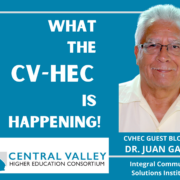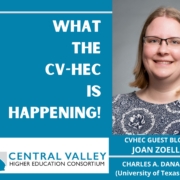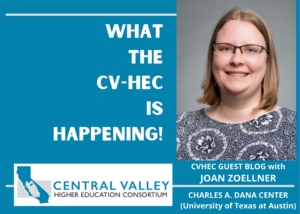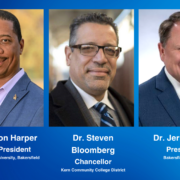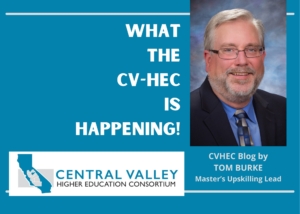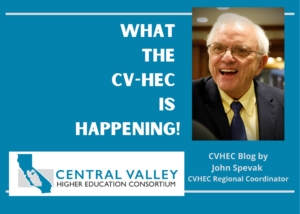WHAT THE CV-HEC IS HAPPENING BLOG (May 2024): Bienestar and Mental Healthcare
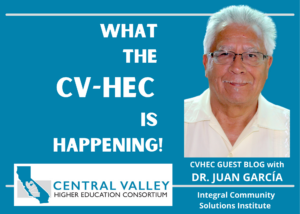 As Mental Health Awareness Month winds down — and keeping in the theme of our special medical education issue — our CVHEC “What the CV-HEC is Happening” blog this month presents a community voice discussing how CVHEC members are participating in a unique project that promotes mental healthcare for Latinx families and how mental illness, like other diseases, can be managed: the Bienestar Wellness Early Intervention Program. Juan C. Garcia, PhD., executive director of the Integral Community Solutions Institute (Community Counseling Services), presents how a two-year $2 million grant from the California Youth Behavioral Health Initiative Round 5 will help reduce barriers in obtaining medical health care; provide a culturally congruent introduction to mental health care in the Central Valley; and provide unique medical education opportunities on partnership with UCSF Fresno and Fresno State. Dr. Garcia is a licensed family therapist, a professor-emeritus of Fresno State’s Marriage and Family Therapy program, and a member of the Latino Mental Health Concilio. He co-founded ICSI in 2011 to provide counseling services to the unserved, underserved and the inappropriately served populations in the Central Valley by promoting community health through advocacy and wellness of the body, mind and spirit.
As Mental Health Awareness Month winds down — and keeping in the theme of our special medical education issue — our CVHEC “What the CV-HEC is Happening” blog this month presents a community voice discussing how CVHEC members are participating in a unique project that promotes mental healthcare for Latinx families and how mental illness, like other diseases, can be managed: the Bienestar Wellness Early Intervention Program. Juan C. Garcia, PhD., executive director of the Integral Community Solutions Institute (Community Counseling Services), presents how a two-year $2 million grant from the California Youth Behavioral Health Initiative Round 5 will help reduce barriers in obtaining medical health care; provide a culturally congruent introduction to mental health care in the Central Valley; and provide unique medical education opportunities on partnership with UCSF Fresno and Fresno State. Dr. Garcia is a licensed family therapist, a professor-emeritus of Fresno State’s Marriage and Family Therapy program, and a member of the Latino Mental Health Concilio. He co-founded ICSI in 2011 to provide counseling services to the unserved, underserved and the inappropriately served populations in the Central Valley by promoting community health through advocacy and wellness of the body, mind and spirit.
Mental Health Awareness Month:
early psychosis in Latinx families
Bienestar Wellness Early Intervention Program for mental healthcare
services to Latino and underserved communities includes CVHEC members
BY JUAN C. GARCIA, PhD.
Executive Director — Integral Community Solutions Institute
Stigma is an overwhelming concern when seeking mental health services in any community. In the Latinx community it is even more of a barrier to services.
Early psychosis in Latinx families is a devastating psychological breakdown of a family member. In the past, Latino families did not know that their child had treatment options.
However, Latinx families can be educated to understand that mental illness is a disease like other diseases and that it can be managed. If they wait too long to receive services for themselves or for their children, the mental illness may become so severe that it would be difficult to manage in the coming years. The earlier they receive services the better for everyone. Prevention education of Latinx families using cultural strategies reduces the long-term severity of this chronic mental health condition.
It is to this end that our community-based, non-profit organization, the Integral Community Solutions Institute (publicly known as Community Counseling Services), has secured funding for the Bienestar Wellness Early Intervention Program to reduce those barriers and provide a culturally congruent introduction to mental health care in the Central Valley.
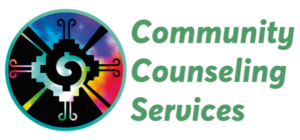 We are excited to gain the support of the University of California San Francisco-Fresno psychiatry residency program as well as support from Fresno State. Both are members of the Central Valley Higher Education Consortium which is made up of 28 institutions of higher education in its ten-county region.
We are excited to gain the support of the University of California San Francisco-Fresno psychiatry residency program as well as support from Fresno State. Both are members of the Central Valley Higher Education Consortium which is made up of 28 institutions of higher education in its ten-county region.
We hope that soon the news will spread to the rest of the community that you don’t have to suffer to receive mental health services. We at ICSI believe in promoting community health through advocacy and wellness of the body, mind and spirit.
The need: services provided inappropriately may trigger more emotional and psychological damage
In California, based on 2019 data, almost four percent of adults were diagnosed with a serious mental illness (SMI) and 7.3 percent of children were diagnosed with severe emotional disorders. In the San Joaquin Valley the incidence rate was 4.8 for adults and 7.8 for children, both slightly higher than the state.
When taking into consideration the federal poverty line, the INCIDENCE rate increases to 8.5 percent for adults with SMI and 10 percent for children with severe emotional disturbance. For the Latinx population, the incidence rate was 4.1 percent for adults and 7.8 percent for children with severe emotional disturbance.
As you probably can surmise, there may be several barriers to mental health access. Some of them are structural such as distance, location and times services are available. Even in the schools the sparse counseling available is limited to the school hours of operation. Critical services are not available in rural areas such as may be needed by someone having a psychotic break in an emergency in Mendota or San Joaquin. To get to services takes time, transportation and availability.
Once you do get to services though, there are another set of problems. If the services are not provided in a language you can understand, that creates lack of access.
There are many indigenous dialects being spoken in the San Joaquin Valley that originate in Mexico and Central America. The cultural clashes are inevitable and the mental health issues ensuing shortly after may become insurmountable without appropriate help. The mental health provider may use interpreters, but many mental health concepts are not translatable creating a cultural and linguistic gap in services. As such, services are provided inappropriately and could trigger more emotional and psychological damage.
Like language, culture has a grammar, structure, and process for effective communication. The use of familiar phrases based on mutually interpretable cultural understanding is imminent in these critical cases. The use of dichos, cuentos, canciones and other cultural understanding components facilitated by familiar symbols and linguistic devices provides the framework for trust, care and healing.
If I see a picture of George Washington cutting the cherry tree in the lobby of a mental health clinic, it does not help me if I am a Latinx client. If I see the symbol of La Virgen de Guadalupe on the wall or even the Aztec Calendar, I can feel assured that someone here understands me.
Culturally responsive or congruent services are needed to reach the client in language and cultural terms that make sense.
Once Latinx families are informed about what mental illness is, the red flags, and that the symptoms are treatable whether through therapy or medication, Latino families and individuals will feel less concerned about stigma. Families need to know that the sooner they can get their loved adolescent or young adult to mental health services the better the outcome. Psychotic symptoms if untreated for more than 18 months makes it more chronic and the individual may be unable to recover their full functioning in their lifetime.
And who is going to attend to these needs?
San Joaquin Valley’s number of practicing psychiatrists is lower than any other region in California including the coast, Los Angeles, San Diego and Sacramento at 6.2 per 100,000, which is nearly half compared to other regions. (See California Health Care Foundation Quick Almanac 2022 ).
We are heartened that, in recent years, the medical education movement in the Central Valley has picked up steam. We applaud leaders at all levels who are making this happen, and especially those who were central in helping us secure our two-year $2 million grant from the California Youth Behavioral Health Initiative Round 5. The project implements a strategy of the Coordinated Specialty Care (CSC) First Episode of Psychosis Program. UC Davis Department of Psychiatry will provide technical support for this project.
In addition to providing services to our community, the ICSI Bienestar project hopes to provide unique educational and training opportunities for programs in the Central Valley including the UCSF Fresno Psychiatry Residency Program and two Fresno State programs: the Rehabilitation Counseling Department and the Department of Social work.
Our goal would be for these training practitioners to be introduced to individuals and their families, and provide treatment via medication and therapy. Importantly, we hope to guide residents and trainees in getting to know the Latinx community, learning to provide culturally competent services and perhaps develop a long-term relationship for care.
One of the current psychiatry residents, Dr. Cecilia Rangel-Garcia, grew up in the Central Valley and plans to practice in the area. An alumna of UC San Diego (Medical Doctor and Master’s in Public Health degrees), she works closely with her residency supervisor, Dr. Karen Kraus, professor of psychiatry in the UCSF Dept of Psychiatry, to finalize a collaborative relationship for this project. (Disclosure: Dr. Rangel-Garcia also is the daughter of the author and Josie Rangel, LCSW, so she is very familiar not only with the professional medical aspects but also cultural and familial aspects).
Enriched training for the Central Valley
“Training in a specific community, working with an organization that is committed to this specific population which makes up a significant portion of the residents, is crucial in training,” says Dr. Rangel-Garcia. “By working with an organization like ICSI, our training will be enriched and we would be able to take and apply the lessons learned wherever we practice in the future. For me, that is the Central Valley.”
The trainee interns from the Rehabilitation Counseling Department and Department of Social Work, who stay with us for 9 – 12 months, are mentored to see clients under the supervision of ICSI’s licensed professionals with weekly meetings to review their cases. They receive training in multicultural aspects of counseling, counseling skills, hypnosis, ACT, DBT, family structural therapy and Integral psychotherapy. ICSI also accepts internships from other universities such as Alliant.
Together through the Bienestar Wellness Early Intervention Program, we can implement cultural strategies to make a connection with the client and communicate with him/her/she/them thus providing a framework for mutual understanding that facilitates the trust, safety and therapeutic alliance process needed while helping train more healthcare professionals to tackle these shortages we face here in the Central Valley.

